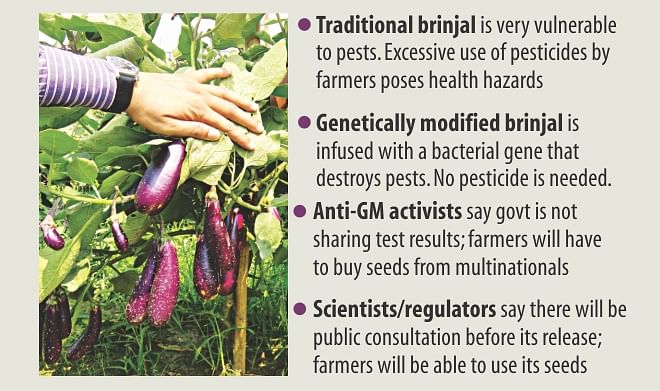Cultivation of Bt Brinjal begins

Bangladesh formally started the cultivation of the country's first genetically modified (GM) crop--Bt Brinjal today.
As part of the initiatives, Bangladesh Agricultural Research Institute (BARI) distributed saplings of the new crop among 20 farmers of four regions.
But, the authorities decided not to sell out the new variety in the market at present, said Jahurul Islam, chief scientific officer of BARI’s Gazipur region.
The speciality of the Bt Brinjal is that the farmers do not need to spray pesticides on it.
Usually, farmers have to spray pesticides up to 80 times in a cropping season of brinjal against a recommended dose of 25, making the vegetable highly toxic.
The new verities developed by the scientists of BARI are—BARI Bt (Uttara), BARI Bt (Kajla), BARI Bt (Nayontar) and ISD006 Bt BARI.
Agriculture Minister Matia Chowdhury today distributed the saplings among the farmers at a programme in the city’s Bangladesh Agriculture Research Centre.
“We have decided to start cultivating Bt brinjal after different necessary tests at home and abroad. We took long time to experiment all pros and cons for introducing the cultivation of this variety”, she said while addressing as the chief guest.
There is alternative to accept the reality of the GM crops to ensure food security of the people, she said adding that the government is always alert of any kind of negative reaction to the public’s health and the environment.
With the journey of cultivating Bt Brinjal, Bangladesh has joined a group of 29 countries that grow GM crops.
BARI scientists engineered brinjal, one of the country’s most consumed vegetables, by inserting a crystal protein gene (Cry1Ac) taken from the soil bacterium Bacillus thuringiensis, known as Bt, back in 2005.
It took seven years to complete greenhouse trials and open-field trials of Bt Brinjal in various agro-ecological zones in the country. Bt gene insertion in brinjal makes it resistant to fruit and shoot borer (FSB) that causes 50 to 70 percent loss of brinjal yield.
However, there were concerns by green groups over release of GM crops in Bangladesh saying threats to the environment and public heath.

 For all latest news, follow The Daily Star's Google News channel.
For all latest news, follow The Daily Star's Google News channel. 



Comments